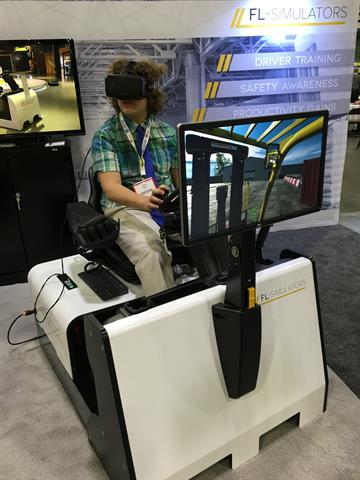 FL-Simulator attracted strong interest at Modex |
By Luc De SmetFL-Simulators Europe will premier its VR forklift simulator at CeMAT later this month. The FL-Simulator is equipped with the newest 360° Oculus stereoscopic goggles that provide the trainee with a set of training scenarios in an immersive, full 3D environment.
The driving force behind the start-up is Belgian developer and designer Jelmen Lombaerts, who recently showed the latest version of the VR simulator on a Hyster-Yale truck at Modex in Atlanta, USA.
Simulator training aims to reduce training costs and risks of damage and accidents on the floor.
This time last year, an earlier version of the simulator had received the MHI (Material Handling Institute) Best New Innovation Award at the 2015 Promat fair in Chicago.
The simulator was a pet project of Lombaerts at the UCAN communication bureau, where he was working. UCAN's simulator developments started in 2010 when it pitched the idea to Toyota Material Handling Europe (TMHE). In an initial version, large screens were mounted onto an actual forklift. The simulator of the internal combustion counterbalance Toyota truck was first shown at Toyota's CeMAT 2011 stand. TMHE drove it around Europe as a demonstrator.
"The screens were eventually replaced by LED screens, but only later did we experiment with (virtual reality) and head tracking that provides the driver with a more lifelike experience," says Lombaerts.
VR requires a different amount of detail and 'crispness'. Simulating a forklift in operation is a different ballgame to aircraft simulation: "A forklift driver gets a lot closer to things than the pilot of an aircraft. For immersion, leaning forwards or sideways will result in a quite different view of the forks or through the mast."
Subsequent improvements wereaimed at reducing the weight and volume of the simulator to make handling more practical. "We reduced things to a smaller, pallet-sized unit. It still weighs 300 kg, but it is easier to set up in a classroom environment. Yet, the equipment remains sturdy and can survive some handling."
It took four years of research and development before a prototype was presented at Promat 2015.
Since then, 10 VR units have been sold from Singapore to NewYork and Western Europe, including to the DHL Innovation Centre.
"After the Innovation Award, we were not ready to scale up." In June 2015, Lombaerts and his partner went their separate ways. Lombaerts took on the simulator technology and set up FL-Simulators Inc. in California, USA, where two new partners are in charge of marketing and technology.
The prototype was refined, based on reactions and requests received at Promat.
A year later, the result was shown at Modex in Atlanta. Now that the product is considered to be fully developed, FL-Simulators wants to go full-throttle.
"We use general parts of real forklifts and CanBus for the controls. That allows us to diversify our offering towards other machines using CanBus technology.
"We are now also developing an electric reach truck simulator."
The hardware unit is fairly basic: steering wheel, dashboard, controls on the armrest, etc. A new software release has further improved graphics for Facebook's latest Oculus Rift headset. The software can be expanded to deal with a variety of configurations, masts and attachments. Extra functions - grippers for paper rolls or cylinders, etc.- can be added on request.
The company kicked off in the US where security is high on companies' priority list and these seem to be more 'technology-savvy', according to Lombaerts. "In Europe, companies are probably more reactive, but that is why we will be at CeMAT." Recently, he also set up a company in Belgium - FL Simulators Europe - headquartered in Mechelen. "We are now looking for extra space for our R&D and are ramping up production."